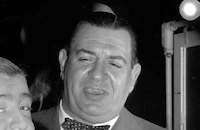Politics

Brief Synopsis
Cast & Crew
Charles F. Riesner
Marie Dressler
Polly Moran
Rosco Ates
Karen Morley
William Bakewell
Film Details
Technical Specs

Synopsis
In the small town of Lake City, music teacher Ivy Higgins and her husband Peter, the town barber, share a house with Hattie Burns and her daughter Myrtle. Ivy, who detests the fact that the town has become a haven for Jim Curango's racketeers, is running for the office of mayor to unseat the current mayor, Tom Collins, who is in a partnership with the mobsters. When Myrtle's friend, Daisy Evans, is killed at the Little Club by Nifty, one of Curango's men, with a bullet intended for Benny Emerson, Myrtle's secret sweetheart, Hattie joins with Ivy in her resolve to close the town's speakeasies. Nifty's bungled murder attempt results in Curango's decision to hang Daisy's murder on Benny, a former gangster who decided to go straight. Unknown to Hattie, Ivy or Peter, Benny, who was injured in the shooting, has taken refuge in their attic. Later, at a re-election campaign meeting for the mayor, the townswomen rally around Hattie when she promises to run the mayor and all the other Lake City thugs out of town and into jail. After Ivy concedes that Hattie would make a better candidate than she, Hattie reluctantly accepts the nomination and later consents to run when the women show their support for her. Realizing that Hattie might pose a threat to his operations, Curango visits her and attempts to bribe and then blackmail her into a partnership with him. Hattie refuses to become involved in his scheme and promptly ejects him from her house. As support for Hattie grows, a protest torchlight parade commences through the streets of Lake City, in which the local women demand the ouster of Collins and the election of Hattie to office. Following the march, a women's meeting is held, but it is soon broken up by the town's male population, who collectively threaten to get drunk and spend all their money if the women persist in promoting Hattie for mayor. In response to the men's behavior, Hattie organizes a female work strike, which effectively infuriates the men. As election day nears, Peter discovers Benny in his attic, and when the police arrive to arrest him, Myrtle becomes hysterical and admits that she was Benny's mysterious girl friend. Fearing that the resulting scandal will surely put an end to her election bid, Hattie pulls out of the race. However, when Nifty is finally arrested for Daisy's murder, he confesses that Benny went straight in order to marry Myrtle and that Curango ordered him to kill Benny. When the truth is learned, another march is held to show support for Hattie, who, with the endorsement of the police chief, wins the mayoral election. Hattie's first duty as mayor is marrying her daughter to Benny, a ceremony in which Ivy, the newly appointed Commissioner of Garbage, acts as matron of honor.

Director

Charles F. Riesner
Cast

Marie Dressler

Polly Moran

Rosco Ates

Karen Morley
William Bakewell

John Miljan

Joan Marsh
Tom Mcguire
Kane Richmond
Mary Alden
Crew
Malcolm Stuart Boylan
Clyde De Vinna
Cedric Gibbons
William S. Gray
Robert E. Hopkins
James Manatt
Paul Neal
Harry Parkins
Wells Root
Sandy Roth
Zelda Sears
Douglas Shearer
Dick Wade
Cecil Wright

Photo Collections
Film Details
Technical Specs

Articles
Politics
Following their comedy hit Reducing (1931), the two actresses moved on to Politics (1931), which followed the usual scenario of their comedies. In the small town of Lake City, music teacher Ivy Higgins (Polly Moran) and her husband Peter, the town barber, share a house with Hattie Burns (Marie Dressler) and her daughter Myrtle. Ivy, who detests the fact that the town has become a haven for Jim Curango's racketeers, is running for the office of mayor to unseat the current mayor, Tom Collins, who is in a partnership with the mobsters. When Myrtle's friend, Daisy Evans, is killed at the Little Club by Nifty, one of Curango's men, with a bullet intended for Benny Emerson, Myrtle's secret sweetheart, Hattie joins with Ivy in her resolve to close the town's speakeasies.
Once again, the public lined up to see the latest Dressler-Moran feature but many critics felt the formula was already wearing thin. Variety noted that "the very evidence of lack of real action by the two principal characters in the cast, Dressler and Moran, is a weakness Metro may not be able to afford if another movie is planned for the pair. It's taking a long chance with the earned drawing power of these two."
MGM ignored the advice and cast Dressler and Moran together again in Prosperity in 1932 but first Dressler would appear solo in Emma (1932) for which she received her second Oscar® nomination as Best Actress.
Director: Charles F. Riesner
Screenplay: Wells Root, Robert E. Hopkins, from a story by Zelda Sears and Malcom Stuart Boylan
Cinematography: Clyde DeVinna
Art Direction: Cedric Gibbons
Film Editing: William S. Gray
Cast: Marie Dressler (Hattie Burns), Polly Moran (Ivy Higgins), Rosco Ates (Peter Higgins), Karen Morley (Myrtle Burns), William Bakewell (Benny Emerson), John Miljan (Jim Curango), Joan Marsh (Daisy Evans).
BW-72m.

Politics
Quotes
Trivia
Notes
A working title for this film was Hell Bent for Election, and it was reviewed as such in Hollywood Reporter.















